Publications Search
This publications portal is a repository of all IOM migration health publications from 2006 to present where IOM was a primary contributor.
Publications include peer-reviewed scientific papers, technical reports, training guides/manuals, policy briefs/discussion papers, factsheets, newsletters, research reviews, conference and poster presentations. These are categorized by topic, author, country/region covered as well as by year, language, and type of publication. The map reflects the countries covered by the publications.
To browse or search: simply use the filter options on the left-hand side. Alternatively, you can enter keyword/s in the search box. Selecting a specific publication will lead to a ‘download’ link or link to the website where the document is housed. Here is the step-by-step guide for your reference.
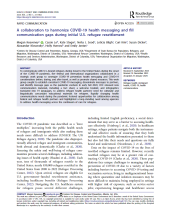
A collaboration to harmonize COVID-19 health messaging and fill communication gaps during initial U.S. refugee resettlement
Author/s: Megan Keaveney, Cassie Le, Kate Steger, Neha J. Sood, Leticia Bligh, Curi Kim, Susan Dicker, Alexander Klosovsky, Holly Herrera, Emily Jentes
To communicate with U.S.-bound refugees during travel to the United States during the onset of the COVID-19 pandemic, five federal and international organizations collaborated in a strategic work group to synergize COVID-19 prevention health messaging and COVID-19 considerations before, during, and after travel, as well as promote shared resources. This work group sought to establish consistent COVID-19 messaging, disseminate messages to partners, and identify message gaps as the pandemic…
Read more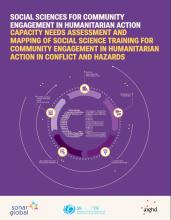
Social Sciences for Community Engagement in Humanitarian Action: Capacity needs assessment and mapping of social science training for community engagement in humanitarian action in conflict and hazards
Author/s: Amsterdam Institute for Global Health and Development, Institut Pasteur - Sonar-Global, UNICEF SBC Unit - SS4CE Team
This report describes the findings of an assessment of needs, gaps and capacity resources for integrating the social sciences for community engagement (CE) in humanitarian action (HA) and programming, including a derived competency framework for SS4CE. These activities were conducted by Sonar-Global’s partner, the Amsterdam Institute for Global Health and Development (AIGHD) with support from Institut Pasteur, for the Social Sciences for Community Engagement in Humanitarian Action (SS4CE in…
Read more
Social Sciences for Community Engagement in Humanitarian Action: Mapping Review on Ethics and Data Sharing
Author/s: FIOCRUZ Fundaçâo Oswaldo Cruz - Sonar Global, Institute Pasteur - Sonar Global, UNICEF SBC Unit - SS4CE in HA team
Social Science for Community Engagement in Humanitarian Action Project (SS4CE in HA) is an initiative launched at the end of 2020, funded by the Bureau of Humanitarian Affairs, USAID. The main objectives focus on co-creation of global goods, designed as a collaborative approach that connects with global humanitarian and public health system-wide existing mechanisms that harness active participation of humanitarian organizations, academic institutions and donors. The processes undertaken for…
Read more
Tuberculosis-related knowledge, practices, perceived stigma and discrimination among patients with tuberculosis: a cross-sectional study in Jordan
Author/s: Rana AlHamawi, Yousef Khader, Hiba Abaza, Srinath Satyanarayana, Nevin Wilson, Ahmad Saleh Abu Rumman, Khaled Okkah
Background
Tuberculosis knowledge, practices, and perceived stigma and discrimination among patients with tuberculosis are key factors for the management of the disease.
Objectives
The objectives of the study were to assess knowledge, practices, perceived stigma and discrimination, perceived family and health workers support, perceived level of satisfaction with healthcare services, delay in diagnosis/treatment and reasons for delay among patients with…
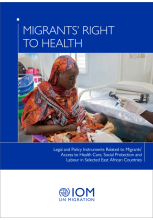
Migrants’ Right to Health – Legal and Policy Instruments Related to Migrants’ Access to Health Care, Social Protection and Labour in Selected East African Countries
Author/s: IOM
The Eastern and Horn of Africa region remains one of the most dynamic regions of the world in terms of migration caused by an evolving complex of economic, social, and security interplay. Migrants and mobile populations continue to face many obstacles in accessing essential healthcare services including migration status, language barriers, lack of migrant-inclusive healthcare laws and policies, inaccessibility of services, and the inability of the receiving country to afford addressing their…
Read moreTracking migration and health inequities
Author/s: Elisa Mosler Vidal, Kolitha Prabash Wickramage
Over 281 million people around the world are counted as international migrants. Many migrants are forcibly displaced – with 36.4 million refugees and 6.1 million asylum-seekers by mid-2023. Furthermore, there were 62.5 million internally displaced people at the end of 2022. While many of these migrants are healthy, many, in particular refugees, asylum-seekers, and internally displaced people, are at risk of poor health outcomes and often experience health-related inequities, facing little or…
Read more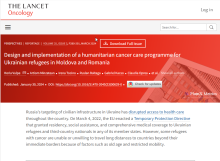
Design and implementation of a humanitarian cancer care programme for Ukrainian refugees in Moldova and Romania
Author/s: Horia Vulpe, Artiom Minzatean, Irena Tocino, Ruslan Baltaga, Gabriel Kacso, Claudia Oprea, Veronica Ciobanu, Sergiu Brenister, Ciprian Tomuleasa, Gabriel Ricu, Rodica Mindruta-Stratan, Catalin Danaila, Dragos Iancu, Ludmila Circiumari, Cristian Teglas, Lars Lonnback, Violina Nazaria, Ursula Wagner, Eugenia Ciubotaru, Nicoleta Minzatean, Ciprian Jitaru, Stanislav Polozov, Inessa Matiushenko, Anna Uzlova, Richard Sullivan, Stefania Magidson
Russia's targeting of civilian infrastructure in Ukraine has disrupted access to health care throughout the country. On March 4, 2022, the EU enacted a Temporary Protection Directive that granted residency, social assistance, and comprehensive medical coverage to Ukrainian refugees and third-country nationals in any of its member states. However, some refugees with cancer are unable or unwilling to travel long distances to countries beyond their immediate borders because of factors such as…
Read more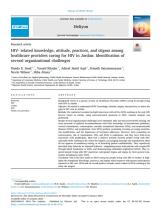
HIV- Related Knowledge, Attitude, Practices, and Stigma Among Healthcare Providers: Caring for HIV in Jordan: Identification of Several Organizational Challenges
Author/s: Randa K. Saad, Yousef Khader, Ashraf Jamil Aqel, Srinath Satyanarayana, Nevin Wilson, Hiba Abaza
Background: There is paucity of data on Healthcare Providers (HCPs) caring for people living with HIV (PLHIV) in Jordan.
Objective: We aimed to understand HCPs’ knowledge, attitude, stigma, and practices, to assess the gaps in HIV care in Jordan.
Methods: We conducted recorded in-depth interviews with all five HCPs working at the only HIV Service Center in Jordan, using semi-structured questions in 2021. Content analysis was performed.
…
Read more
Migration Health Research Bulletin, Issue No. 27
Author/s: IOM
The issue of the Bulletin features publications on migration, zoonoses, infectious diseases, non-communicable diseases, mental health, among others.
The audio podcast episode discusses the importance of the inclusion of migrants into policies and actions towards zoonotic disease prevention and control as well as outlines guidance on the…
Read more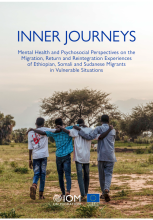
Inner Journeys: Mental Health and Psychosocial Perspectives on the Migration, Return and Reintegration Experiences of Ethiopian, Somali and Sudanese Migrants in Vulnerable Situations
Author/s: IOM
This study examines the consequences that migration, return and reintegration experiences have on the mental health and the psychosocial well-being of returning migrants, with the primary purpose of informing policies, programmes and advocacy initiatives that promote sustainable reintegration. The analysis is relevant not only to mental health and psychosocial support (MHPSS) specialists, but also to protection officers and to return and reintegration practitioners, as it can inform the…
Read more